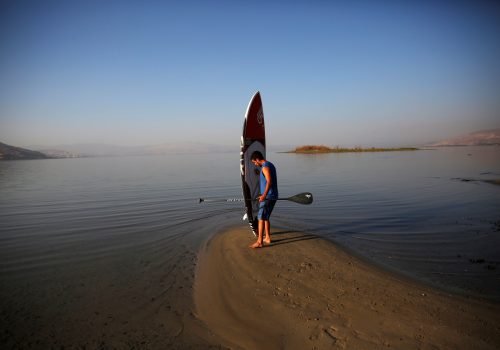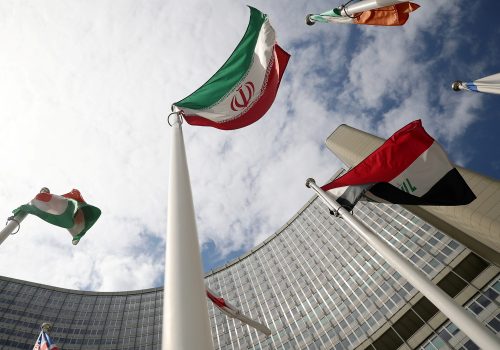How President Biden can tackle the Middle East’s biggest problems
Nine joint recommendations from experts at leading think tanks in the United States, United Arab Emirates, and Israel
As US President Joe Biden takes office and confronts the mire of interlocking crises that afflict the Middle East, he has an opportunity to score some early successes and avoid familiar minefields that loom ahead. In a first project of trilateral collaboration, the directors and strategists from leading think tanks in the United States, the United Arab Emirates (UAE), and Israel have submitted nine recommendations on issues that deserve priority treatment from the new administration. They range from fighting the COVID-19 pandemic and restraining Iran’s nuclear program, to resuscitating Israeli-Palestinian peace efforts.
Leveraging a new regional landscape of cooperation made possible by the Abraham Accords, the Atlantic Council in Washington, the Emirates Policy Center in Abu Dhabi, and the Institute for National Security Studies in Tel Aviv formed a strategic partnership in October 2020. The three institutions will tap the expertise of their researchers in the fields of government, diplomacy, security, intelligence, business, and media to offer guidance to policymakers over the coming years. Through joint reports, conferences, and online seminars, the partners intend to reinforce regional stability and promote mutually beneficial ties between Israel and the Arab world.
The alignment of many Arab, Israeli, and American visions represents a new architecture in the Middle East. It signals a tectonic shift that creates new diplomatic options and geopolitical levers. While brokered by the Donald Trump White House, the Abraham Accords offer valuable new tools of economic statecraft, which the Biden team should embrace.
Implementation of these recommendations can be kicked off during the first half of 2021.
1. Develop a Middle East regional response to the COVID-19 pandemic for controlling the virus’s spread and distributing vaccines. Addressing the impact of the coronavirus continues in 2021 to be the world’s most pressing need and requires coordination throughout the Middle East and North Africa. Cooperation in vaccine research by Israel and the UAE sets one good example. The Biden administration should work with the World Health Organization, the World Bank, and other agencies to ensure that poorer countries in the region can make the vaccine available to their populations as well.
2. Consult closely with Middle East allies while working to curtail Iran’s nuclear ambitions and regional aggression. Drawing lessons from the conflicting approaches of the Barack Obama and Trump administrations, the United States should establish an official channel for multilateral dialogue with the Gulf states and Israel, perhaps adding Egypt and Jordan, with the expressed goal of finding ways to mitigate threats from Iran—which include nuclear proliferation, hostile intervention within the region and beyond, ballistic missiles, cyber operations, and disinformation campaigns. Initiate planning toward building necessary military, intelligence, and civilian security resources in Israel, the UAE, and Bahrain for the sake of collaboratively addressing the threats posed by Iran and its proxies. Returning to the Joint Comprehensive Plan of Action (JCPOA) should be done only in conjunction with aligned efforts to secure Iran’s commitment to correct the outstanding points of contention.
3. Make a declaration that eases concerns about US military withdrawal from the Middle East. The Biden administration should authorize an independent panel drawn from the United States, European allies, and other regional partners to review the US presence in the Middle East and recommend how Arab-Israeli normalization can help secure the region. The presence of US military forces contributes to stability in the region and the advancement of normalization. The panel should also address US concerns about Chinese and Russian efforts to gain access to its technologies and databases. The review should examine how to ensure the flow of energy through essential maritime routes such as the Strait of Hormuz and Bab al-Mandeb. The United States should maintain its naval and air capabilities in Bahrain and Qatar but not require additional manpower. The panel should direct a dialogue with regional partners on cooperation in scientific and technological fields with the aim of elevating both US and regional sectors and reducing attempts by America’s competitors to dominate markets in the region.
4. Promote Arab-Israeli cooperation as a catalyst for peace, security, and prosperity in the Middle East and beyond. Encourage countries across the region to establish open ties with Israel, providing incentives and including steps towards regional peace. Boost multilateral efforts that promote peace and prosperity in the region, including through continuing funding for the Middle East Desalination Research Center (MEDRC) in Oman. Senior leaders of the United States, Israel, and Arab states should resolve to air differences discreetly and avoid enabling spoiler narratives that undermine normalization.
5. Restructure Israeli-Palestinian peace efforts. Work to rehabilitate a durable two-state outcome that establishes political, territorial, and demographic separation between Israel and the Palestinian Authority (PA) through transitional arrangements. The Biden administration should work to create a pathway for diplomatic engagement between Israel and the PA, and offer assurances that Israel’s security will not be harmed by Palestinian statehood. The United States should restore Palestinian economic and humanitarian assistance, address the crisis in Gaza, and reinstate the Jerusalem consulate. Arab states should be helpful in supporting Palestinian participation, politically and materially. Israel should take constructive steps to improve conditions for peace and limit actions that undermine progress between the parties. The PA should resume full security cooperation with Israel and end policies that reward violence against Israelis. All parties should work to address the threat posed by Hamas’ continued control of Gaza.
6. Coordinate counterterrorism and civilian security efforts with NATO, Israel, and Arab partners through training local allies, addressing the threat of violent extremists such as ISIS. Establish a mechanism for military, intelligence, and civil security cooperation to advance joint priorities regarding counterterrorism, missile defense, intelligence sharing, and operational planning that includes the United States, Israel, and Arab states. Begin joint military exercises and training with Israel and Arab partners on naval de-mining, and defending against unmanned aerial vehicles and improvised explosive devices. Open discussion with nations of the Abraham Accords and countries of strategic importance to the United States in the region like Saudi Arabia about a regional security order.
Refrain from immediate decisive action on the Saudi relationship but do start the process of diplomacy with the kingdom, as the kingdom’s near complete revision of its stance on the sponsorship of religious extremism can make it an important partner going forward in preventing and countering terrorism and radical recruitment in the region and beyond. Saudi Arabia has the ability to lower energy prices to a point that could set back the Biden energy diversification agenda. Balancing America’s interests against its differences with Saudi Arabia is a foreign policy puzzle for every US administration.
7. Address humanitarian disasters stemming from armed conflict in Yemen, Syria, Libya, and Iraq. Create a “consultation only” security roundtable with the United States, European allies, Israel, and Arab or Muslim-majority states to discuss how regional conflicts could spill over to participating nations. Current priorities could include Libya, Syria, Lebanon, Somalia, Sudan, and the changing role of Turkey. Promote stabilization, religious tolerance, backchannel dialogue, and political transition efforts.
8. Channel interest from the business community and civil society within Israel and the Gulf states to reinforce political links. Bringing together US, Israeli, and Emirati technological aptitude with resources and manpower can drive all parties forward on vital projects that traverse the region—including multinational rail lines, fiber-optic networks, and oil and gas pipelines. Authorize a joint commission of experts to draft recommendations for improved intra-regional energy infrastructure to reduce dependence on adversarial providers exploiting their neighbors’ energy vulnerabilities.
9. Encourage people-to-people contacts between the United States, Israel, and Arab countries that have diplomatic ties with Israel. The Biden administration has made a positive step in signing an executive order to reverse the restriction on citizens of several Muslim-majority countries traveling to the United States. Use this moment to create a positive trajectory. Encourage Middle Eastern students to enroll in US universities. Establish an exchange program to promote people-to-people ties. Institute an official exchange scholarship—with US federal funds and similar to the Fulbright program—in each nation, celebrating the Abraham Accords. Explore cooperative synergies in areas such as education toward tolerance, the environment, and opportunities for youth and the disabled.
Kirsten Fontenrose is director of the Scowcroft Middle East Security Initiative at the Atlantic Council.
Ebtesam Al-Ketbi is founder and president of the Emirates Policy Center.
Udi Dekel is managing director of the Institute for National Security Studies.
To follow the work of the partnership, please visit the Atlantic Council, the Emirates Policy Center, and the Institute for National Security Studies. For press inquiries, please contact press@atlanticcouncil.org.
Related content

Through our Rafik Hariri Center for the Middle East and Scowcroft Middle East Security Initiative, the Atlantic Council works with allies and partners in Europe and the wider Middle East to protect US interests, build peace and security, and unlock the human potential of the region.

